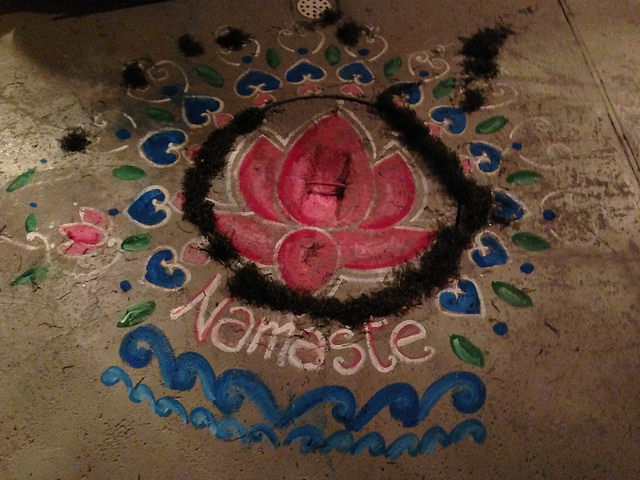When I started meditating, I didn’t have expectations that it would do anything for my depression.
I thought depression was treated by therapy and diet and exercise, not sitting silently and watching my breath.
However, as I’ve come to view meditation as an essential part of my daily life and embraced the Dharma as a path of practice, my whole life has changed, including my relationship to my depression. It has not gone away, it still arises, but it no longer knocks me down the way it used to.
For the last 25 years, I have had episodes of time where I feel like I have a wet blanket wrapped around my brain, muffling any wholesome thoughts. A well of tears that can’t be cried. A brain that tells me doing anything out in the world that requires me taking my pajamas off is akin to throwing myself into the mouth of a volcano.
The duration of these episodes change. The time between them and the time of year they occur is unpredictable. Sometimes the episodes are brought on by a particularly intense life event; sometimes it’s just a Tuesday. The only thing I know for certain is that these episodes do arise.
In order to treat my depression, I’ve tried to change things on the outside; how much I exercise, what therapist I go to, where I live, what I do for work. That has all helped a little bit. But, when I started to change things inside, when my meditation practice began to help me change my relationship with my mind, I was able to treat my depression in a different way.
While these changes were organic and happened over time, I’ve begun to clearly see some specific Dharma tools that have helped me change my relationship with my depression. I now feel more functional and steady, even when I am going through a depressive episode.
1. Let Go.
I’ve had to let go of the idea that I will do something, or that something will happen that my depression will never come back. Due to a chemical imbalance in my brain, these episodes will probably always arise in my life. But, I can change how I relate to them.
Across all schools of Buddhism the core theme remains the same: let go, let go, let go. When I let go of my expectations, things seem to get a lot easier. From letting go of the idea that my depression will not come back, when I do get an episode, I’m a little less surprised and a little less pissed off.
2. Notice Delusion.
I see that my depressive brain is really delusional. It’s trying to tell me I don’t know how to function in the world, and that the world is better off without me. Delusion is one of the three poisons in Buddhism. It is one of the unwholesome states of mind that takes us away from the present moment and away from freedom.
When we can see an unwholesome state of mind, we can chose to abandon it, to not put all of our focus there. When I know my thought is delusional, I can let it go. It may still chatter on in the background, but I’m not focusing on it and making it bigger.
3. Mindfulness of the Body.
The reason I can see my delusion is because I practice mindfulness of the body. I sit and bring my attention back to my breath and body over and over again. The more I do this (whether I’m having a depressive episode or whether I’m not), the more clear my understanding is of what is happening within me.
Today, I feel my depression as a lump in my throat and tension in my jaw and belly. So when I have a thought, and check in with my body, I can see what sensations are arising, which helps me identify my thought as a wholesome thought or a depressed/delusional thought.
4. Impermanence.
Nothings lasts. Everything changes. The Buddha considered the understanding of impermanence so essential he considered it one of the three marks of existence. If nothing lasts, then this depressive episode won’t last forever. It will change.
It doesn’t help to just know that, I also need to feel it. When I feel that the lump in my throat has lessened from earlier, I am feeling impermanence. I can rest in the knowledge that this episode, like everything else, is impermanent.
5. Forgiveness.
My delusive/depressed brain likes bring up everything I have ever done “wrong” in my life. So I need to forgive myself. This is a practice I do daily, so that when I am depressed, I have a foundation of forgiveness already.
I sit and breathe with my hand on heart, and as things arise that I beat myself up for I bring forgiveness instead.
“I forgive you for not wanting to pay attention to this meditation.”
“I forgive you for not being able to let go and hating your depression right now.”
“I forgive you for saying that one thing to that person yesterday.”
Sometimes I feel the forgiveness and sometimes it just feels like I’m saying the words. But it’s getting harder and harder for me to beat myself up, because I’m cultivating forgiveness and kindness toward myself.
6. Spiritual Friends.
These are people that we can rely on to let us be authentic and support us on our path. They may or may not have the same faith or practice as we do, but they have a deep desire to support our path of practice. I have a teacher, a partner, and friends that I can reach out to when I am experiencing a depressive episode. They know enough about my patterns to reach out to me. My depressed/delusive brain tells me I am unworthy of love, yet friends show me otherwise every time.
7. Realize Dharma is Everywhere.
While Buddhism is my primary path of practice, the Dharma is in everything. So sometimes, I need to find other places of support when I’m experiencing a depressive episode. Maybe it’s a massage, maybe therapy, maybe acupuncture—whatever helps supplement my care for myself is all part of the practice.
I still don’t feel great when I’m having a depressive episode. Some days, I still want to live in my pajamas. But these tools, and my Dharma path, have helped me have a more manageable relationship with my depression. I can take off my pajamas and once again be a part of the world.
Relephant Read:
11 Ways to Be an Effective Partner When Your Girlfriend or Wife has Depression & Anxiety.
~
Author: Kate Spina
Apprentice Editor: Carlene Kurdziel; Editor: Catherine Monkman
Photo: Flickr/Kyle Pearce; Flickr



Read 5 comments and reply